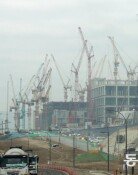Resolution of Bar Association Stirred Political Circle
Resolution of Bar Association Stirred Political Circle
Posted July. 25, 2001 19:26,
The resolution adopted by the Korean Bar Association (chairperson Chung Jae-Hun) criticized the withdrawal of the constitutionalism has stirred not only the political circle but also the whole Korean society. The stunning impacts of the resolution are rooted in the symbolic status of KBA as the representative intellectual elites and the legal experts.
The lawyers of KBA are divided into the supporters of the resolution by KBA`s executive board that criticized the government`s reform policies and the disagreeing factions who argue that the resolution does not reflect the opinions of all lawyers.
A leading lawyer Mr. Lim remarked, ``Many lawyers agree to the outcomes of the attorneys` conference. The present government has ignored the criticisms and complains of the opposing sectors in the pretext of reformation.``
A member of MinByun, Lawyers for a Democratic Society (chairperson Song Du-Hwan), also said that ``if they are free from the connections to the government by regions or schools, 9 out of 10 lawyers may say that they are against the policies of the present government. The antipathetic attitude of KBA toward the civic organization might have driven KBA to adopt the resolution. They might have thought that they should say something instead of the civic organizations that have not criticized the wrong government policies.``
A leading lawyer of KBA said that ``the executive board of KBA was legally elected and the resolution was also adopted by a just procedure. Therefore, the resolution is the official opinion of KBA.``
However, some antagonists raised questions about the content of the resolution, the procedure, and the criticisms about the reform policies.
MinByun released its `position on the resolution of KBA,` which reads ``the resolution uses vague expressions, without providing specific examples. It is highly questionable that the resolution reflect the general opinion of the whole KBA members.``
The Lawyers for a Democratic Society also argued that the fundamental problem of reformation lies in the crisis of failure by the protestant of the privileged sectors and the retrogressed will to reformation.``
A leading lawyer of the Seoul KBA also commented that ``whether the resolution reflects the general opinion of KBA is controversial. The political remark of a speaker for disobedience against the government` was not appropriate. We will discuss it at the executive members meeting.``
Meanwhile, scholars, businesspersons, and the middle class citizens generally agreed to the resolution of KBA and insisted that the government has to accept the criticism.
Managing director Park Kwang Taik (51, StocktoFunds) remarked that ``the government sticks to the demagogic politics based on populism. The criticism of KBA, a representative privileged circle, implies significant meanings. That is the warning against the government heading to the revolutionary situation.
Salary man Kwon Dae-Hyun (31, Bangbae, Seoul) said, ``I agree with KBA in general. The law enforcement of the government seems to not equally apply whether they are supporting groups of the government or opposing sectors. The present government is excessively attached to the reformation.``
Prof. Huh Young stated that ``the government should not neglect nor distort the meaning of the resolution rather humbly accept the criticisms of KBA.``
Porf. Choi Byung-Sun also commented that ``the resolution of KBA reflects the complains and distrusts of the Korean intellectual society against the government. The basics of the constitutionalism are fairness, freedom, and consensus, which lack in our society.``
Lee Soo-Hyung sooh@donga.com




![‘무사고 장롱면허’ 1종 안준다…내년 달라지는 도로교통법 [알쓸톡]](https://dimg.donga.com/c/138/175/90/1/wps/NEWS/IMAGE/2025/12/30/133064716.2.jpg)


